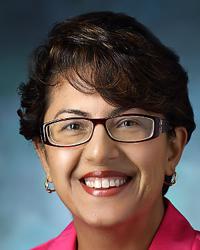Research Lab Results
-
Maunank Shah Lab
Work in the Maunank Shah Lab focuses on infectious disease modeling and health economics, and seeks to investigate new strategies for diagnosing HIV and tuberculosis (TB) in areas with limited resources, both domestically and abroad. Our primary focus is TB diagnostics, with studies examining the diagnostic test accuracy, cost-effectiveness and programmatic impact of emerging diagnostics. We have developed mobile health initiatives to incorporate video-based therapy for TB treatment, and we have a longstanding interest in interventions that help to reduce or prevent HIV transmission. -
IndoUS Clinical Research
Our IndoUS team, based both in Baltimore and in India, specializes in international clinical research (cohort studies and clinical trials), public health implementation science and education in infectious diseases, HIV/AIDS, tuberculosis (TB), vaccine preventable illnesses, antimicrobial resistant infections, and more recently COVID. Since 2003, our work has been focused primarily on India, where we are engaged in several Indo-JHU and international research collaborations. We partner with several leading medical and research institutions in India (e.g. BJGMC, DY Patil, Hinduja Hospital, KEM, Bharati Vidyapeeth, NIRT, JIPMER, CMC, Medanta, IISER, YRG, IIT), as well as others in sub-Saharan Africa, US and Brazil. We are actively involved in the following consortia: 1) Indo-US Vaccine Action Program sponsored RePORT India TB research consortium, which is funded by the US National Institutes of Health (NIH) and the government of India, Department of Biotechnology. 2) RePORT International TB Research Consortium, a multilateral global consortia for TB research, 3) US NIH funded multi-country HIV and TB trials consortia of the AIDS Clinical Trials Group (ACTG) and the International Maternal Pediatric Adolescent AIDS Trials Network (IMPAACT) Network, 4) NIH and AmFAR funded IeDea HIV/TB Working Group and the Treat Asia-IeDEA HIV and TB epidemiology databases, and 5) CDC SHEPHERD AMR studies. Our group has been awarded research grants from the US NIH, US CDC, UNITAID, Indian government, and several philanthropic foundations to investigate infectious diseases of importance to India and beyond.
-
Richard Chaisson Lab
Research in the Richard Chaisson Lab primarily examines tuberculosis and HIV infection, with specific focus on global epidemiology, clinical trials, diagnostics and public health interventions. Our recent research has involved evaluating a molecular diagnostic test for tuberculosis in HIV patients; observing TB responses during treatment of pulmonary tuberculosis; and examining antiretroviral therapy adherence, virologic and immunologic outcomes in adolescents compared with adults in Southern Africa.
-
Arturo Casadevall Lab
The Arturo Casadevall Lab uses a multidisciplinary approach to explore two key topics within microbiology and immunology: how microbes cause disease and how hosts can protect themselves against those microbes. Much of our research focuses on the fungus Cryptococcus neoformans, which frequently causes lung infections in people with impaired immunity. We also work with the microorganism Bacillus anthracis, a bacterium that causes anthrax and is frequently used in biological warfare. Our goal is to devise antibody-based countermeasures to protect against this and other similar threats.
-
David Sack Lab
Research in the David Sack Lab focuses on enteric infections. Our team has worked to develop laboratory detection methods to better understand the epidemiology of these agents. We also work to create appropriate clinical management strategies, such as antibiotics and rehydration methods, for enteric infections. Our work has included participating in the development of vaccines for a range of bacterial infections, including rotavirus, cholera and enterotoxigenic E. coli.
-
Emily Kendall Research Group

-
Hoffmann Lab
The Hoffmann Lab is focused on reducing TB and HIV morbidity and mortality in the low and middle income settings through behavioral and implementation science approaches. Work has focused on understanding individual-level behavior towards linkage to care and continued care engagement for HIV and TB and using this knowledge to develop approaches to increase HIV testing, linkage to care, HIV viral load suppression, and retention in care. Other work has focused on health system strategies to improve service delivery and improve adherence to best practice to guidelines-based care. The group's research includes work on the general population, corrections inmates and ex-inmates, men at risk for HIV, and recently hospitalized individuals. Most of the research has been in South Africa and elsewhere in sub-Saharan Africa.
-
Robert Bollinger Lab
The key research interests in the Robert Bollinger Lab include identifying biological and behavioral risk factors for HIV transmission as well as characterizing the clinical progression and treatment of HIV and related infectious diseases. We also have a long-standing interest in optimizing health care capacity and delivery in settings with limited resources. Our work includes implementing science research projects to explore the effectiveness of initiatives such as task-shifting, clinical education, distance learning and mobile health programs as a way to improve health care in these locations.
-
Maryam Jahromi Lab
The Maryam Jahromi Lab researches infectious diseases such as influenza, tuberculosis, endocarditis, viral hemorrhagic fevers, brucellosis, Clostridium difficile and Crimean-Congo hemorrhagic fever. We are particularly interested in the impact of the influenza vaccine on systemic inflammation. Recent areas of focus include the relationship between influenza vaccination and cardiovascular outcomes, the emergence of Crimean-Congo hemorrhagic fever in Iran, and prospects for vaccines and therapies for Crimean-Congo hemorrhagic fever.
-
Robert Gilman Lab
Research in the Robert Gilman Lab focuses on disease control. Our work led to the development of microscopic-observation drug-susceptibility (MODS), a rapid tuberculosis diagnostic technique. We continue to conduct infectious disease research based at Peru’s Universidad Peruana Cayetano Heredia.
